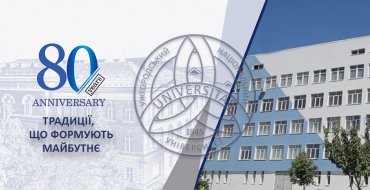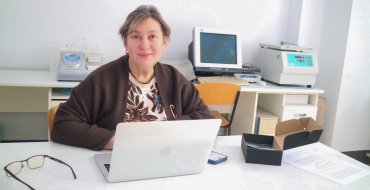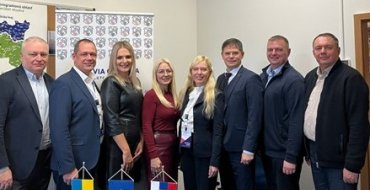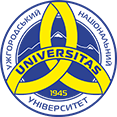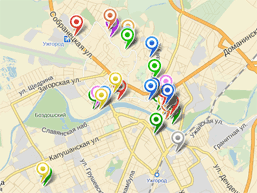On the creation of a nice space at UzhNU for the children of IDPs with the assistance of international partners
Thousands of internally displaced persons have found their shelter in 6 dormitories of Uzhhorod National University since the beginning of the war. Most of them are families with children. After the first weeks of shock, everyone began to realize that the war would last long. So, a lot of IDPs decided to look for jobs and settle down in Uzhhorod. However, most parents faced the problem of the lack of places in kindergartens. And if you don't have a place to leave your kid for a day, you can’t go to work.
Opening a children's playroom, or space for kids, in one of the university dormitories became a salvation. It is a beautifully renovated space with purchased modern furniture, equipment, toys and didactic materials, and most importantly, with professional teachers and a psychologist, who, as it turned out, had to work not only with children, but also with their parents...
An old idea of Marianna Kolodiy
The Vice-Rector of UzhNU Myroslava Lendel says that the idea of creating such a space arose quite a long time ago, and its author is Marianna Kolodiy, a senior lecturer at the Department of Political Science and Public Administration, and the head of the Center for Gender Education at UzhNU.
Myroslava Lendel is explaining, “Marianna formulated the idea that the university should have some space for kids, a place where mothers - teachers and students with young children – could leave their kids for the period of the educational process to have the possibility to teach or attend classes, if they are female students, and then take their children away.
For various reasons, this idea could not be implemented for a long time: either due to the lack of time, resources, or the absence of premises for the children's space. However, we developed a project of the University's Sustainable Development Concept last year and one of the activities to be implemented this year was the creation of a space for mothers and children. We considered the option of opening such room at the Faculty of Social Sciences, which trains students of social work, psychology and preschool education. Accordingly, students could be educators there and help to look after children and gain some practical skills at the same time.
By a strange coincidence, the Concept had to be considered and approved by the Academic Council of the university on February 24, 2022. However, the war began on that day. The Academic Council did not convene, and respectively the Concept was not considered, therefore we decided to finalize it taking into account the realities of the war and post-war times. This document will be approved, but it will require certain adjustments.
Thus, the idea of creating a space for mothers and children was postponed again, however, not for long.”
Bit-by-bit a nice space for children appeared
“When the war began, a lot of IDPs moved to Uzhhorod and were accommodated in the university dormitories. We spoke with them, and many said that it was difficult to get a job because they had no one to leave their children with. At the same time, Uzhhorod kindergartens were overcrowded and there were problems with places even for the Uzhhorodians’ children. Then we recalled the idea of creating this space. The situation with the displaced people and their kids became the final push for us and incentive to implement the long-standing idea,” says Myroslava Lendel.
"It happens that things don’t stick together for a long time, but suddenly the stars align and everything is quickly resolved. The same happened with the children's room."
Oksana Svezhentseva, the head of the international relations department at UzhNU, says that on the same day when they decided to look for a way to help displaced people from the university dormitories, they saw an announcement by the Visegrad Foundation which provided support to Ukrainian organizations creating social opportunities for IDPs.
“And we decided to try to implement our old idea. The idea was described, our grant application was supported. At the same time,we agreed with the Organization of Volunteers of UzhNU that they would apply for the grants the university couldn’t apply for. The Organization of Volunteers applied for the funds of the Carpathian Foundation, which works only with NGOs, as a result, some amount of money needed for the implementation of our idea was provided by the Carpathian Foundation. UzhNU funded the renovation of the room for the future children's space. "Nehemiah" NGO also help us, they bring water, cookies and fruit for the children. University employees have brought toys and books for children from home. As a result, bit-by-bit, we created a very nice room for kids in dormitory No.3,” - says Oksana Svezhentseva.
Zhanna Mylyan, "We work not only with children, but also with parents"
"The work in the children’s space is structured as follows: in the morning until lunch (from 9 a.m. to 1 p.m.), a psychologist and pedagogues-organizers (teachers of the department of pedagogy and pedagogy of higher education) work with the children, then parents take their children for lunch and a nap, and then from 3 to 7 p.m. there’s group work. The groups are guided by our master students who already have experience in preparing children IDPs for school (they work in a Sunday school at one of the churches of Uzhhorod). It is important to note that the services provided for parents IDPs by the children's space are completely free of charge."
Zhanna Mylyan, a leading specialist of the department of pedagogy and pedagogy of higher school and a teacher-organizer in the newly created children's space, says that in the peak periods she had to work with 25 children at the same time. These were both preschoolers and 6-year-olds who were being prepared for school.
“Now, it’s relatively quiet in the center, because we currently have only 5 kids. From September 1, parents sent some children to school, some IDPs returned home or moved to their relatives, some children went to kindergartens here in Uzhhorod. Thanks to this, parents or their relatives, with whom they live here, were able to find jobs and go to work,” says Zhanna Mylyan.
"Afternoon groups in the children's space have three directions: artistic, logical-mathematical and philological or linguistic. In the English lessons, our teachers try to help the kids learn Ukrainian as well, because almost all children speak either Russian or Surzhyk."
“There are children who have been preparing for school here for the last 2-3 months, now they are first-graders, but after school they keep coming to us for group work in order to continue learning Ukrainian, because they need it at school to understand their teachers better,” Zhanna Mylyan says.
Svitlana Kulakova: "Burnout is high. But our work is not in vain"
Svitlana Kulakova, a leading specialist of the social and psychological service of UzhNU, is a child psychologist in the project. Previously, she did not work with internally displaced persons, therefore, she says, her expectations and reality differ significantly. Although Ms. Kulakova prepared herself specially for work in the children's space.
“Before starting to work here, I attended the trainings organized by the NGO “Doctors Without Borders”. These trainings gave me a very good basis so that I could distinguish traumatized children. In this work, I have always relied on the knowledge I have received from this NGO, and I am really grateful to Doctors without Borders for it.”
She tells that it is necessary to work with children both individually and in groups. Some children have experienced very serious stress and injuries. One of the boys was constantly throwing and smashing toys at the beginning. The psychologist shows one of the broken plastic baskets that the kid crushed.
“At first he had such behavior. I observed and then I began to intervene with the aim of correction, so that he would stop crushing and breaking and start creating. Each time, I had to approach the boy and work with him individually. I also use body-oriented therapy. If a child is pinched, bound, and his or her body language reveals it, relaxation exercises are needed. Stroking and carrying a child in our arms is our usual everyday work,” says Svitlana Kulakova.
The psychologist is telling about a turning point in her group work with children, "At the beginning, they built bomb shelters, brought water and imaginary food there and hid it. And in August, just before the Independence Day, they created ... a shared house."
“It was so impressive. They took blankets and began to create the space for themselves. They stopped pushing and fighting and everyone crawled into this house they had created like into a mitten. It was the result of our three months long work and we were very impressed,” says Svitlana Kulakova.
She admits that working with such a large number of children (as well as parents) who have experienced stress is very difficult.
“If only I had known that I would have to recover myself, I might not have joined this project. Honestly speaking, burnout is very high. You have to allocate your own resources, how you will live. You need to have peace inside you to work here. And peace is not limitless.,recovery is needed. We encountered something we did not expect, and one of our colleagues simply left - she couldn't stand it,” says Svitlana Kulakova. And yet, in a minute, she adds: “But this work has also become a serious professional and life experience for us, and it is great to see the result - the people who have changed. They do not lead a parasitic lifestyle: they sent their children to school or kindergarten, found jobs, settled down in a new place. They are developing and they grateful to us. We understand that our work is not in vain. It gives us strength and impetus to keep working.”
Yaroslv Svitlyk for zaholovok.com.ua
P.S. To the attention of parents from among employees or students of UzhNU. If you have a need and desire to use the opportunities of the children's space for your kids, please fill in the form at this link.


